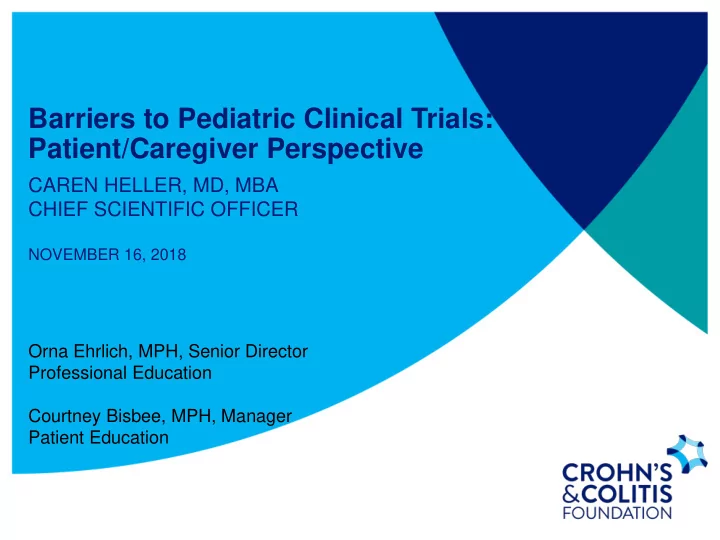

Barriers to Pediatric Clinical Trials: Patient/Caregiver Perspective CAREN HELLER, MD, MBA CHIEF SCIENTIFIC OFFICER NOVEMBER 16, 2018 Orna Ehrlich, MPH, Senior Director Professional Education Courtney Bisbee, MPH, Manager Patient Education
Foundation’s Research on Clinical Trial Participation Goals: Methodology: • Understand attitudes, knowledge, • Conduct focus groups with: and beliefs regarding • Adult patients participation in an IBD clinical • Pediatric patients trial • Caregivers of pediatric patients • Create resources to increase • Providers awareness, education, and support of clinical trials • Conjoint analysis to survey: • Support enrollment and retention • Adult patients in IBD clinical trials • Caregivers of pediatric patients • To understand trade-offs 2
Focus Group Timeline Spring 2016 – Fall 2016 – Fall 2017 – Winter 2018 – 22 caregivers 36 adult 23 adult 11 adult GIs and pediatric patients patients • Portland, Oregon patients (11 each) • Cleveland, Ohio • Atlanta, GA • Boise, Idaho • Ann Arbor, • Los Angeles, CA • Miami, Florida Michigan • Washington D.C. • Greenwich, • Dallas, Texas • New York, NY Connecticut 3
Focus Group Findings (Adult patients) Adult attitudes Adult motivations towards clinical for participation trials Acknowledge promising nature of trials in finding Advance the science new treatments Desire for more clinical Achieve remission more trials to focus on cure vs. quickly new treatment options only Still hesitant to enroll, Access free medication assume last resort only 4
Focus Group Findings (Pediatric/Caregivers) Pediatric attitudes Caregiver towards clinical perceptions of trials clinical trials Fearful and uncertain Altruistic towards towards child’s participation participation Neutral descriptors; “new Negative descriptors; medicine,” “test,” “help “scary,” “uncertainty,” “too others” risky,” “guinea pig,” “fear” Motivated to advance Struggle with decision to science enroll their child 5
Focus Group Findings Barriers Solutions For parents: disease could Further exploring the worsen, wouldn’t enroll significance of this focus child in placebo-controlled group finding in the trial conjoint analysis Limit number of visits to clinics For children: missing school/ activities Offer pick-up/drop off services when applicable Time away from home, Use of telemedicine in distance to get to trial site trials 6
Focus Group Findings (Provider Support in Participation) Involvement of Provider perspective pediatric provider (adult GIs) Realize they play significant role in referring Present trial opportunities patients to trials Discuss what it means to Unsure when to participate to parent and recommend a trial child Need for best practices on How GI would be involved referral to clinical trials in child’s care during trial 7
Focus Group Findings Key takeaways: Patient/ • Personal benefit Caregiver • Altruism Motivation • Clinical trials not mentioned No GI • Not integrated in routine Support care • Would provide reassurance GI Referral • More comfortable participating 8
Conjoint Analysis: Patient Trade-offs • Verify findings of the focus groups utilizing choice - based conjoint surveys • Partnering with RTI International • Determine: • Which attributes of clinical trials patients value most • Predict the probability of enrollment in proposed clinical trials • Focus on adult patients and caregivers of pediatric patients 9
Conjoint Analysis: Patient Trade-offs Attributes being examined: Doctor Involvement Placebo Rate Number of colonoscopies or flex • Conducting trial • 0, 2, 3, 5 out of 10 sigs participants will receive • Not conducting, but placebo • 2, 3, 4 procedures/year request reports from trial • Not involved at all Time spent per Open label extension Monetary month during study compensation • Yes or no • 3, 6, 12, 24 • $0, $300, $750, $2000 hours/month over life of trial 10
Sample Question from Conjoint Analysis Survey Given the two options in the table, which trial would you choose for your child to participate in for 1 year ? 11
Preliminary Findings: Caregivers Interest of patient participating in IBD clinical trial N=686 Caregiver Demographics Caregiver 40.00% 35.42% 35.42% 35.00% Race (% Nonwhite) 16.91% 30.00% Gender (% Female) 61.08% 25.00% Household Income 50.94% 18.80% 20.00% (% ≤ 75k) 15.00% Education (% Some 92.77% 10.00% 5.83% College or more) 4.52% 5.00% Insurance Status (% 9.22% 0.00% Very Interested Interested Neither Not Interested Not at all W/O Health Insurance) Interested nor interested not interested 31.05% Past Participation in IBD clinical trial? Yes No 68.95% 12
Preliminary Findings: Satisfaction Scores by Trial Attribute
Next Steps • Publish findings from focus groups and conjoint analysis • Translate findings into publicly available enrollment predictor calculator 14
Thank You Questions? 15
Recommend
More recommend